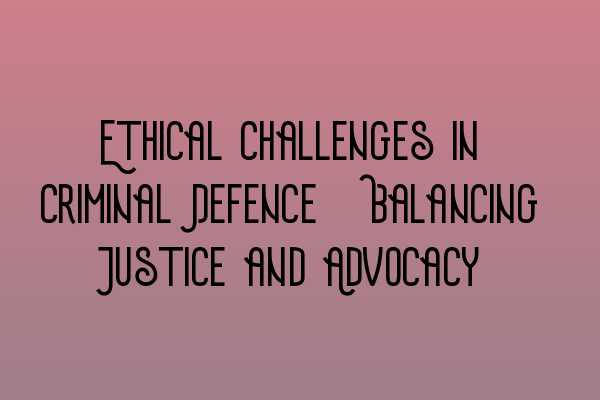Ethical Challenges in Criminal Defence: Balancing Justice and Advocacy
As criminal defence solicitors, we face numerous ethical challenges in our practice. It is our duty to both protect the rights of our clients and ensure justice is served. However, this delicate balance between advocacy and the pursuit of justice can sometimes create ethical dilemmas that require careful consideration.
One of the most significant challenges we encounter is the responsibility to provide a robust defence for our clients, even when we may personally disagree with their actions. Our duty as solicitors is to act as zealous advocates within the boundaries of the law. It is our ethical obligation to present the best possible defence for our clients, regardless of our personal opinions.
The Ethical Obligation to Ensure Justice
Ensuring justice is a fundamental principle of our criminal justice system. In defending our clients, we play a crucial role in upholding this principle. However, it is essential to remember that advocating for justice does not mean endorsing or condoning wrongful behavior.
As lawyers, we are bound by a code of professional ethics that requires us to balance our duty to our clients with our obligation to uphold the integrity of the legal system. This means carefully navigating the thin line between providing an effective defence and avoiding any unethical practices.
One way we can maintain this balance is by conducting thorough research and investigation to uncover all relevant evidence. This ensures that justice is served, as all facts are brought to light. By presenting a comprehensive defense, we can enable the court to make an informed decision.
The Challenge of Confidentiality
Confidentiality is another ethical challenge we face as criminal defence solicitors. Our duty to maintain client confidentiality is of utmost importance, as it fosters trust and encourages open communication. However, there may be situations where this duty conflicts with our moral or ethical obligations.
In such cases, seeking the guidance of an ethics committee or consulting with colleagues can help us navigate through these challenges. By ensuring that our actions align with the ethical standards set by our profession, we can uphold the integrity of both our practice and the legal system as a whole.
Continued Professional Development and Ethics Training
To effectively address the ethical challenges we encounter in criminal defence, ongoing professional development and ethics training are crucial. Staying updated on the latest legal and ethical standards allows us to better serve our clients and uphold the principles of justice.
At SQE Criminal Law & Practice Law UK, we believe in providing comprehensive training programs to equip solicitors with the necessary skills and knowledge to navigate the complex ethical landscape of criminal defence. Our SQE 1 Practice Exam Questions and SQE 1 Practice Mocks FLK1 FLK2 courses can help solicitors develop their advocacy skills while understanding the ethical considerations involved.
Furthermore, our SQE 2 Preparation Courses ensure that solicitors are well-prepared to handle the practical aspects of criminal defence while maintaining ethical integrity. By enrolling in these courses, solicitors can enhance their abilities to balance justice and advocacy.
Conclusion
Ethical challenges are an inherent part of the practice of criminal defence. As solicitors, we must continually strive to strike the delicate balance between advocating for our clients and upholding the principles of justice. By maintaining a high standard of ethical conduct, conducting thorough research, and seeking ongoing professional development, we can navigate these challenges with integrity and responsibility.
For more information about the SQE exams and important dates, please visit the SRA SQE Exam Dates page.
